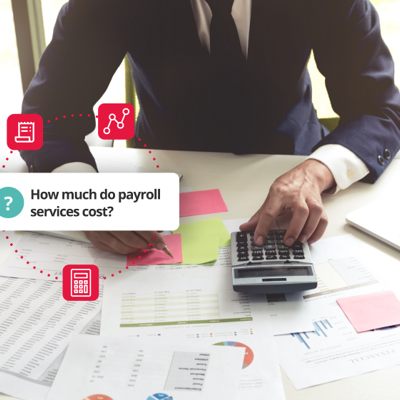How Much Do Payroll Services Cost for SMBs?

Payroll is an extremely important part of your business operations, and ensuring that it’s handled correctly helps to keep employees happy and avoid potential fines for failure to comply with legal requirements.
In this article, we’ll explore how much a payroll service costs, the factors influencing the price, and tips for managing them effectively. We’ll also explore how much outsourcing payroll services costs compared to managing it in house, helping you to decide on the best approach for your business.
How much does a payroll service cost on average?
How much payroll services cost varies depending on several factors, which we’ll explore in the next section of this article. This includes whether your business opts for fully or partially outsourced payroll services, or whether you choose to manage the process in house. As a guide, you can expect to pay between £2 and £25 per employee per month. This fee usually includes basic services such as processing payments, calculating deductions and filing payroll taxes.
There may also be additional one-off and ongoing costs associated with payroll services, which you’ll need to consider separately. This includes setup fees, payslip generation, and additional services such as tax filing and benefits administration. These fees are separate from the cost of payroll software, which depends on the size of the business and the specific features of the chosen solution.

4 factors that impact how much a payroll service costs
The cost of your payroll services is influenced by various different factors. Understanding them can help you to anticipate ongoing payroll expenses and make informed decisions.
Company size
The size of your business plays a significant role in determining how much payroll services cost. Larger companies with more employees generally incur higher costs because they tend to have more complex payroll requirements and higher staff numbers, which means that their payroll service provider needs to process more data and transactions. As providers often charge per employee per month, this model will be more expensive for businesses with more employees.
Frequency of payroll
How often you run payroll directly impacts how much outsourcing payroll services costs. Weekly or bi-weekly payrolls typically cost more than monthly ones due to the increased processing frequency. Additionally, businesses with complex shift patterns, irregular hours or detailed timesheets may face higher costs as these variables require more intricate calculations and adjustments, increasing the administrative workload for your payroll provider.
Service level
The cost of outsourcing payroll varies depending on the level of service you choose. A fully managed service, where an external company handles all aspects of payroll on your behalf, will naturally cost more than a partially managed service that provides less comprehensive support. You might also choose from a variety of different add-on services, such as payslip generation, pension auto-enrolment and preparing year-end tax documents, each of which will incur its own fee.
Payroll provider
Different payroll providers offer varying pricing models and service packages, which can significantly affect how much payroll services cost. It’s important to compare providers to find the best fit for your budget while making sure that the service offered is in line with your business needs. We’ll explore some cost-saving tips later in this article.
Industry-specific payroll costs
What payroll services cost can vary significantly across different industries due to the specific requirements of how they operate. For instance, industries such as construction may have higher costs due to the complexity of handling varied pay rates and seasonal workers. Employers in the hospitality and retail sectors may face additional challenges due to high staff turnover rates, while remote and seasonal businesses may require specialised services, each of which can impact overall pricing.

Do payroll services cost less for a partially managed service?
When considering how much it costs to outsource payroll, it’s important to differentiate between fully and partially managed services. Outsourcing payroll services costs more if you opt for a fully managed solution, where the provider takes care of all payroll functions, including compliance, tax filings and more. As a guide, fully managed payroll services cost businesses between £4 and £25 per employee per month. For partially managed payroll services, the average cost per employee per month is around £3.
Although this means higher costs, fully outsourcing payroll provides greater peace of mind for businesses, and helps them to ensure that their employees are paid accurately, on time, and in compliance with relevant employment legislation. Depending on your requirements, a partially managed service might be less expensive, offering a more hands-on approach for businesses willing to manage some payroll tasks themselves. While the cost savings can be appealing, the trade-off may include more administrative work and a higher risk of errors.

How much does it cost to outsource payroll compared to managing it in house?
There’s no straightforward answer to whether outsourcing payroll services cost more or less than managing the process in house, as the cost depends on a wide variety of factors, as we’ve explored above. For businesses choosing whether to outsource or hire their own payroll team, it’s important to weigh these factors against the pros and cons of in-house versus outsourced payroll to decide which is the most cost effective for their specific needs.
With the right tools and software, it can be fairly straightforward to do payroll yourself, saving money for business. Managing payroll in house might be cheaper for very small businesses that have simple payroll needs and just a few employees. On the other hand, businesses with limited HR resources might find that outsourcing is a more cost-effective solution, as it reduces the risk of errors and ensures compliance with regulations.
Businesses choosing to manage their payroll process in house need to consider a wide variety of ongoing expenses, including everything from recruitment costs and employee pension contributions to the hardware and software required to run payroll.
Payroll service cost-saving tips
There are several ways to reduce how much payroll services cost without compromising on quality, some of which may be suitable for your business. However, remember that how much payroll services cost isn’t just about the fees you pay each month to run the process; a more expensive solution may deliver time-saving benefits, peace of mind and compliance support that outweigh the financial savings on paper.
Embrace self-service
Implementing self-service tools for employees can reduce the administrative burden on your payroll provider, potentially lowering your ongoing payroll service costs. By allowing employees to manage their own information, such as updating personal details, submitting timesheets and requesting annual leave, self-service reduces the need for manual data entry by payroll administrators, leading to fewer errors and faster processing times. The efficiency gained through self-service not only saves time but also translates to cost savings, as providers may charge less when fewer manual interventions are required.
Unbundle services
When considering how much it costs to outsource payroll, pay close attention to what exactly you’re paying for. Some providers offer bundles that combine a wide range of systems and functionalities into a single price. While this might be good value when compared to the individual price of each service, you might end up paying more overall for things you don’t need. Unbundling services allows you to pay only for what your business needs, and gives you the opportunity to add or remove functions as your business grows.
Negotiate contracts where possible
Negotiating with your provider can be a strategic way to manage and potentially lower your payroll service costs. For example, providers may offer discounts for long-term contracts, for committing to more services, or when using certain payment terms. It’s also worth discussing whether any additional features or customisations that you need can be included at a reduced cost or as part of a bundle. By being proactive in negotiations, you can achieve better value and control over your payroll service costs.
Build a long-term relationship
Building a strong, long-term relationship with your payroll provider could lead to significant cost benefits over time. Providers often reward loyal customers with better rates and discounts on additional services, or may offer exclusive support tiers with faster response times. A long-term partnership also means your provider becomes more familiar with your business’s specific needs, leading to more tailored and efficient services. This familiarity can reduce errors and improve the overall efficiency of payroll management, ultimately lowering costs.
How much does it cost to outsource payroll compared to managing it in house?
There’s no straightforward answer to whether outsourcing payroll services cost more or less than managing the process in house, as the cost depends on a wide variety of factors, as we’ve explored above. For businesses choosing whether to outsource or hire their own payroll team, it’s important to weigh these factors against the pros and cons of in-house versus outsourced payroll to decide which is the most cost effective for their specific needs.
With the right tools and software, it can be fairly straightforward to do payroll yourself, saving money for business. Managing payroll in house might be cheaper for very small businesses that have simple payroll needs and just a few employees. On the other hand, businesses with limited HR resources might find that outsourcing is a more cost-effective solution, as it reduces the risk of errors and ensures compliance with regulations.
Businesses choosing to manage their payroll process in house need to consider a wide variety of ongoing expenses, including everything from recruitment costs and employee pension contributions to the hardware and software required to run payroll.

Payroll service cost-saving tips
There are several ways to reduce how much payroll services cost without compromising on quality, some of which may be suitable for your business. However, remember that how much payroll services cost isn’t just about the fees you pay each month to run the process; a more expensive solution may deliver time-saving benefits, peace of mind and compliance support that outweigh the financial savings on paper.
Embrace self-service
Implementing self-service tools for employees can reduce the administrative burden on your payroll provider, potentially lowering your ongoing payroll service costs. By allowing employees to manage their own information, such as updating personal details, submitting timesheets and requesting annual leave, self-service reduces the need for manual data entry by payroll administrators, leading to fewer errors and faster processing times. The efficiency gained through self-service not only saves time but also translates to cost savings, as providers may charge less when fewer manual interventions are required.
Unbundle services
When considering how much it costs to outsource payroll, pay close attention to what exactly you’re paying for. Some providers offer bundles that combine a wide range of systems and functionalities into a single price. While this might be good value when compared to the individual price of each service, you might end up paying more overall for things you don’t need. Unbundling services allows you to pay only for what your business needs, and gives you the opportunity to add or remove functions as your business grows.
Negotiate contracts where possible
Negotiating with your provider can be a strategic way to manage and potentially lower your payroll service costs. For example, providers may offer discounts for long-term contracts, for committing to more services, or when using certain payment terms. It’s also worth discussing whether any additional features or customisations that you need can be included at a reduced cost or as part of a bundle. By being proactive in negotiations, you can achieve better value and control over your payroll service costs.
Build a long-term relationship
Building a strong, long-term relationship with your payroll provider could lead to significant cost benefits over time. Providers often reward loyal customers with better rates and discounts on additional services, or may offer exclusive support tiers with faster response times. A long-term partnership also means your provider becomes more familiar with your business’s specific needs, leading to more tailored and efficient services. This familiarity can reduce errors and improve the overall efficiency of payroll management, ultimately lowering costs.
Start your outsourced payroll journey today
Now you’ve got a better idea of how much it costs to outsource payroll, as well as the factors that impact these costs, you might like to explore different options to support your business. While outsourcing payroll is often the great option for SMBs, it’s important to identify the specific requirements of your business and weigh up the pros and cons, as well as the costs and savings, before making your decision.
PeopleHR’s outsourced payroll service helps SMBs to save time, reduce errors, ensure compliance, and increase cost efficiency. To find out more, get in touch with our expert team, or sign up for a free demo to see our payroll solution in action.



